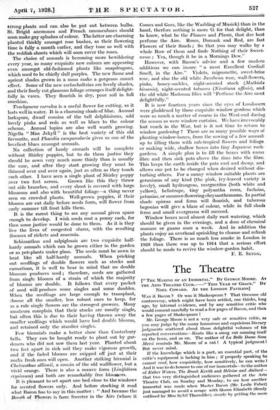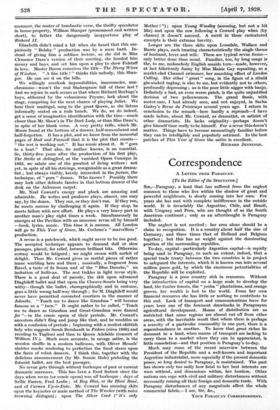The Theatre
[" THE MAKING OF AN IMMORTAL." BY GEORGE MOORE. Al THE ARTS THEATRE CLUB.-" THIS YEAR OF GRACE." BY NOEL COWARD. AT THE LONDON PAVILION] WAS it Bacon ? Or was it Shakespeare ? That tiresome old controversy, which might have been settled, one thinks, long ago, by internal evidence, and by any sensitive critic who would consent carefully to read a few pages of Bacon, and then a few pages of Shakespeare Mr. George Moore is not a very safe or sensitive critic, as you may judge by the many humorous and capricious literary judgments scattered about those delightful volumes of his reported conversations—Keats like a smug cat sunning itself on the lawn, and so on. The author of La Belle Dame Sam Merci reminds Mr. Moore of a cat 1 A typical judgment I But never mind.
If the knowledge which is a part, an essential part, of the critic's equipment is lacking in him ; if properly speaking he cannot read, how exquisitely, how sensitively, he can write I And it was to do honour to one of our immortals—to the author of Esther Waters, The Brook Kerith and Ileloise and Abilard- that two very distinguished audiences gathered at the Arts Theatre Club, on Sunday and Monday, to see how another immortal was made when Master Bacon (Mr. Leslie Faber) just managed to avoid a scrape with Queen Elizabeth (firmly outlined by Miss Sybil Thomdike). simply by getting the mere
mummer, the ranter of bombastic verse, the thrifty speculator in house-property, William Shaxper (pronounced and written short), to father the dangerously inopportune play of Richard IL Elizabeth didn't mind a bit when she heard that this sus- piciously " Bolshy " production was by a mere bard. In- stead of giving him a sublime lecture, as she did in Miss Clemente Dane's version of their meeting, she handed him money and bays, and set him upon a play to show Falstaff in love. Master Baco:a conceives the title—The Merry Wives of Windsor. " A fine title ! " thinks this nobody, this Shax- per. He can see it on the bills.
We willingly overlook impossibilities, inaccuracies, ana- chronisms—wasn't the real Shakespeare full of these last ?
And we rejoice in such scenes as that where Richard Burbage's boys, abhorred by the voluminous Prynne, lark about the stage, competing for the next chance of playing Juliet. We hear their madrigal, sung to the great Queen, as she listens informally seated on a rude bench. We do, we do indeed, get a sense of imaginative identification with the time—much closer than Mr. Shaw's in The Dark Lady, or than Miss Dane's, in spite of her blank verse. A very pretty trifle, which Mr. Moore found at the bottom of a drawer, half-remembered and half-forgotten. It has a plot, and we know from the immortal pages of Hail and Farewell that it is the plot that counts- " the rest is working out." It has music about it. It " goes to a beat." That also, its author knows, is an essential.
So, thirty-five years after the production of his first play, The Strike at Arlingford, at the vanished Opera Comique in 1893, we salute one of the greatest of living writers : not yet, in spite of all his strivings, recognizable as a great drama- tist ; but always visibly, keenly interested in the facture, the technique, of " pure " drama. Who knows ? Possibly there may lurk other delicate fancies in that bottom drawer of the desk on the Aubusson carpet.
Mr. Noel Coward's energy and pluck are amazing and admirable. He writes and produces plays, almost, one may say, by the dozen. They run, or they don't run. If they run, he meets success by challenging it again. If they stop, he meets failure with new effort. He plays a very heavy part in another man's play eight times a week. Simultaneously he emerges at the Pavilion with an immense revue all by himself —book, lyrics, music. This time it is success. All London will go to This Year of Grace, Mr. Cochran's " marvellous " production.
A revue is a patchwork, which ought never to be too good. The accepted technique appears to demand dull or slow passages, placed, for relief, between brilliant bits. Otherwise ecstasy would be fatigued ; we might swoon with surfeit of delight. Thus Mr. Coward gives us restful pieces of rather inane warbling here and there ; musically, a fragment from Ravel, a taste of de Souza and of the " Blue Danube," an imitation of Sullivan. The rest tinkles in light revue style.
There is a good deal of parody, the skit upon advanced Diaghileff ballet and that upon the Chauve-Souris being very witty—though the ballet, choregraphically and in costume, goes a little wrong half-way through ; for M. Diaghileff would never have permitted coroneted courtiers in the manner of lolanthe. " Teach me to dance like Grandma " will become famous as a " turn." It ought rather to be called, " Teach me to dance as Grandma and Great-Grandma were danced for"—in the comic opera of their periods. Mr. Coward's ancestors didn't fling and jump like that, and he muddles us with a confusion of periods ; beginning with a modest-skittish lady who suggests Sarah Bernhardt in Fedora (circa 1880) and
receding to Taglioni and then to Queen Adelaide (consort of William IV.). Much more accurate, in savage satire, is the wooden shuffle in a modern ballroom, with Oliver Messels' sinister masks rendering to perfection the fixed stares upon the faces of robot dancers. I think this, together with the delicious announcement (by Mr. Sonnie Hale) preluding the *futurist ballet, are the best passages.
No revue gets through without burlesque of past or current • dramatic successes. This has been a fixed" feature since the
days when revue (or comic opera) was all burlesque ; days of Nellie Farren, Fred Leslie ; of Ruy Blas, or the Blasé Roue, and of Carmen Up-to-Data. Mr. Coward has amusing skits- upon the keynotes or main method of The Wrecker (with noise drowning dialogue) ; upon The Silver Cord (" it's only
Mother ! ") ; upon Young Woodley (amusing, but not a bit like) and upon the row following a Coward play when (by chance) it doesn't succeed. A merit in these caricatured excerpts is their extreme brevity.
Longer are the three skits upon Lonsdale, Wallace and Barrie plays, each treating characteristically the single theme of husband, loyer and wife. These are typical revue items-- only better done than usual. Familiar, too, by long usage is the, to me, melancholy English seaside turn-Tmade, however,' at last hilariously funny by Miss Maisie Gay repeating, as a scarlet-clad Channel swimmer, her marching effect of London Calling. Her other " great " song, in the figure of a ribald gin-soaked ragbag, is also to me, but evidently not to others, profoundly depressing ; as is the poor little nigger with banjo. Definitely a bad, an even worse patch, is the quite unjustified derision of two policewomen. The grand finale, with motor cars, I had already seen, and not enjoyed, in Sachs Guitry's Revue du Printemps several years ago. I return in conclusion' to the remark—here hardly a reproach—I have made before, about Mr. Coward, as dramatist, or satirist of other dramatists. He lacks originality—perhaps doesn't give himself time really to be himself. For a revue this doesn't matter. Things have to become nauseatingly familiar before they can be intelligibly and popularly satirized. In the best patches of This Year of Grace the satire is excellent.
RICHARD JENNINGS.







































 Previous page
Previous page